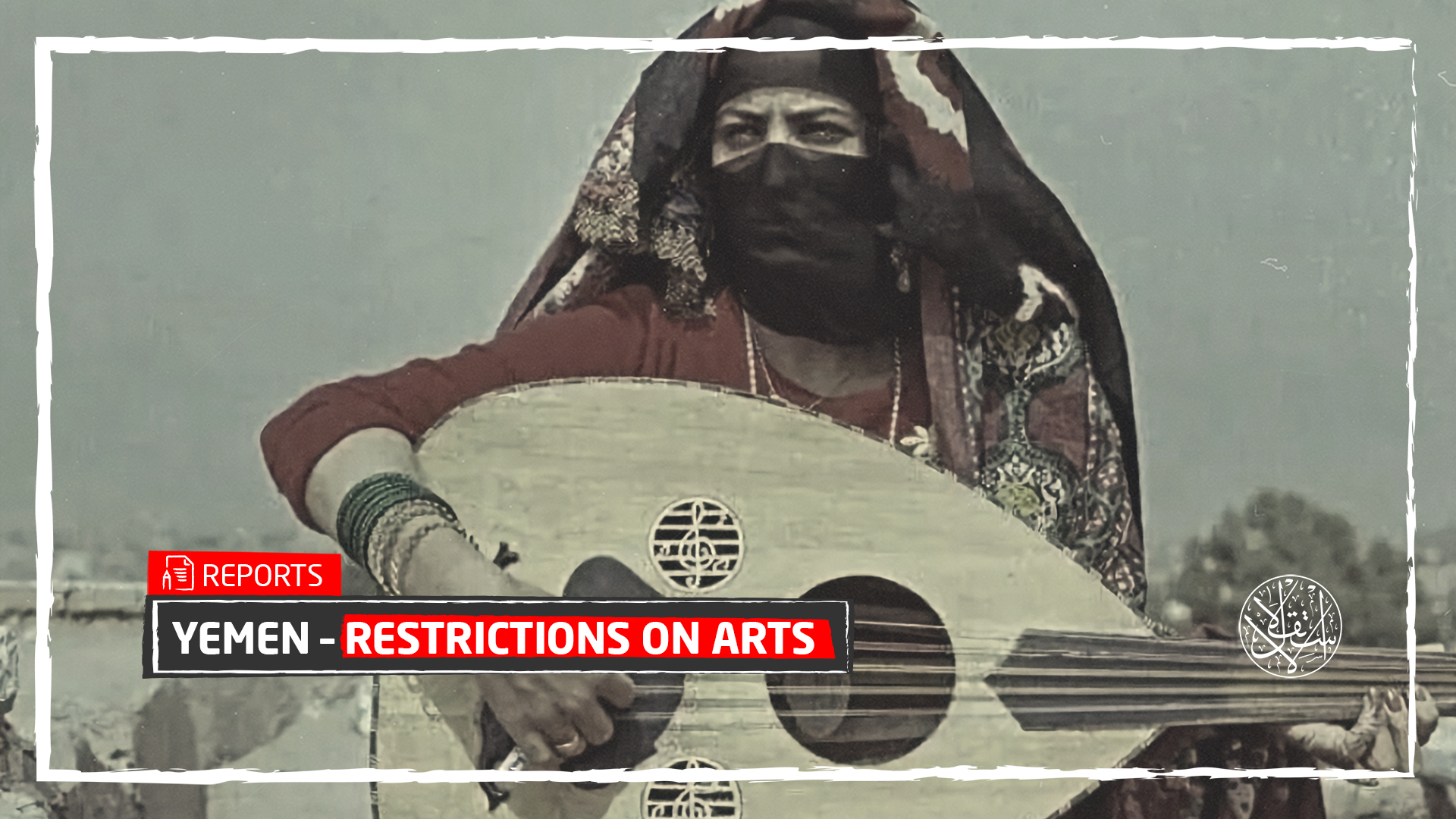‘Yemeni Song Day’; A Form of Resistance Against the Houthi Group’s Restrictions on Arts

Yemeni woman playing the traditional oud, 1970 circa. Photographer: Abdulrahman Al Ghabri.
On the first official occasion, Yemenis celebrated “Song Day” as a folklore on July 1, 2021, in reaction to the Houthi group's restrictions on the Yemenis’ public life.
The Yemeni legitimate government adopted “July 1” as a national occasion to celebrate the local song, after intellectuals and social activists called for the adoption of an annual event to celebrate the Yemeni song.
The Minister of Information, Culture and Tourism, Moammar Al-Eryani, said in a tweet, on July 1, 2021, that “the designation of a day to celebrate the Yemeni song came in interaction with the initiative launched by a number of artists, intellectuals and activists.”
Al-Eryani added that this comes “to enhance identity and protect Yemeni heritage and art in the face of the fierce campaign launched by the Iranian-backed Houthi movement against art and artists.”

Yemeni Song Day celebration poster showing Yemeni pioneer singers.
A Reaction
The announcement and celebration of this day as a national day for Yemeni song, came as a reaction to the measures taken by the Houthi group to restrict the Yemeni public life, including the prohibition of listening to songs in some governorates, and partially banning them in others.
Writer and journalist Shaker Khaled said: “There is a very large campaign that exceeded expectations on the occasion of Yemeni Song Day, perhaps because it came as a strong reaction to Houthi measures that touched the most important components of Yemeni identity.”
Khaled confirmed to Al-Estiklal that “this reaction is natural, because it came as an intense expression of rejection of the Houthi militia’s continuous measures to provoke Yemenis, as the militia presents every day one uglier image than the other to confirm that it is against the will of the Yemenis and that it represents a different version of them and does not resemble them at all.”
He continued, “the Houthi group recalled a history of decades of darkness in which art and singing were taboo, and therefore standing on July 1 of each year as a day commemorating the Yemeni song is one of the symbolic national occasions for rejecting bulldozing operations against Yemenis.”

Yemeni Song Day/ July 1
Anger and Criticism
Al-Houthi group, as a partial restriction, banned singing at weddings after 10pm on June 28, 2021, on the pretext of not disturbing the neighboring residents, and the measure, like other measures, caused an angry wave and a mockery of the Houthis.
The former Minister of Culture, Khaled Al-Rowaishan, wrote on Facebook, commenting on the Group’s measures to prevent singing: “3,000 years ago, Yemeni women used to play and sing and rule the country, and you want to prevent Yemenis from singing today!”
He added, "At the dawn of Islam, the Yemeni tribes of Aws and Khazraj in Yathrib (the Ansar) greeted the Holy Prophet with songs, singing: ‘The full moon rose over us, from the valley of Wada’,’ and it is the melody that is still sang today—according to Arab music scholars—and you want to prevent Yemenis from singing today!"
Al-Rowaishan continued: “Centuries ago, the song united Yemenis’ feelings and emotions, when politics divided, songs united, and the song continues to this day as a balm for the wounds of the Yemeni spirit, uniting their hearts.”
He also wrote another post, commenting on the day chosen for the Yemeni song: “When the people respond; They tried to prevent singing in the countryside of Sana'a, and the people responded by singing! They even made an anniversary and a festival for the song. What a response! Our people are alive and our soul is glowing despite all the sorrows.”
As for parliamentarian Ahmed Saif Hashed, he wrote a post on his Facebook account, in which he said: “It is the right of citizens in other regions, and indeed in all of Yemen, to resist the Group’s [Houthis’] project, which wants to devour pluralism and diversity and impose its presence on everyone by power and force.”
He added: “What happens from time to time in trying to impose the Group's [Houthis’] prohibitions on what is permissible, has become like persistent attempts to impose this project by force, in a way that makes all Yemenis fear this Group, and are more frightened of its future intentions.”
Symbolic Resistance
According to observers, the memorialization of this day in Yemeni memory is a perpetuation of the identity that relied on art as one of the tributaries of Yemeni civilization that stands as a “wall of resistance” against other civilizations (Persian in particular), in order to prevent the obliteration or erosion of the Yemeni identity.
The writer Shaker Khaled said: “There is an indication of the accumulation of this resistance awareness and its effectiveness after the government responded to the campaign and issued a decision to designate July 1 of each year as a day to celebrate the Yemeni song. There is no doubt that the celebration of this day expresses awareness that the Houthi militia is rushing the procedures to obliterate identity and raze reality to generate another sectarian identity and reality.”
He continued: “The Group benefits from a dysfunctional reality and international and regional complicity with the power of arms and unlimited support, but this will certainly remain resistance in all its symbolic forms, although our generations will continue to suffer from a bitter reality and the accumulation of a culture different from them—a foreign culture that will require an unknown time to purify.”












